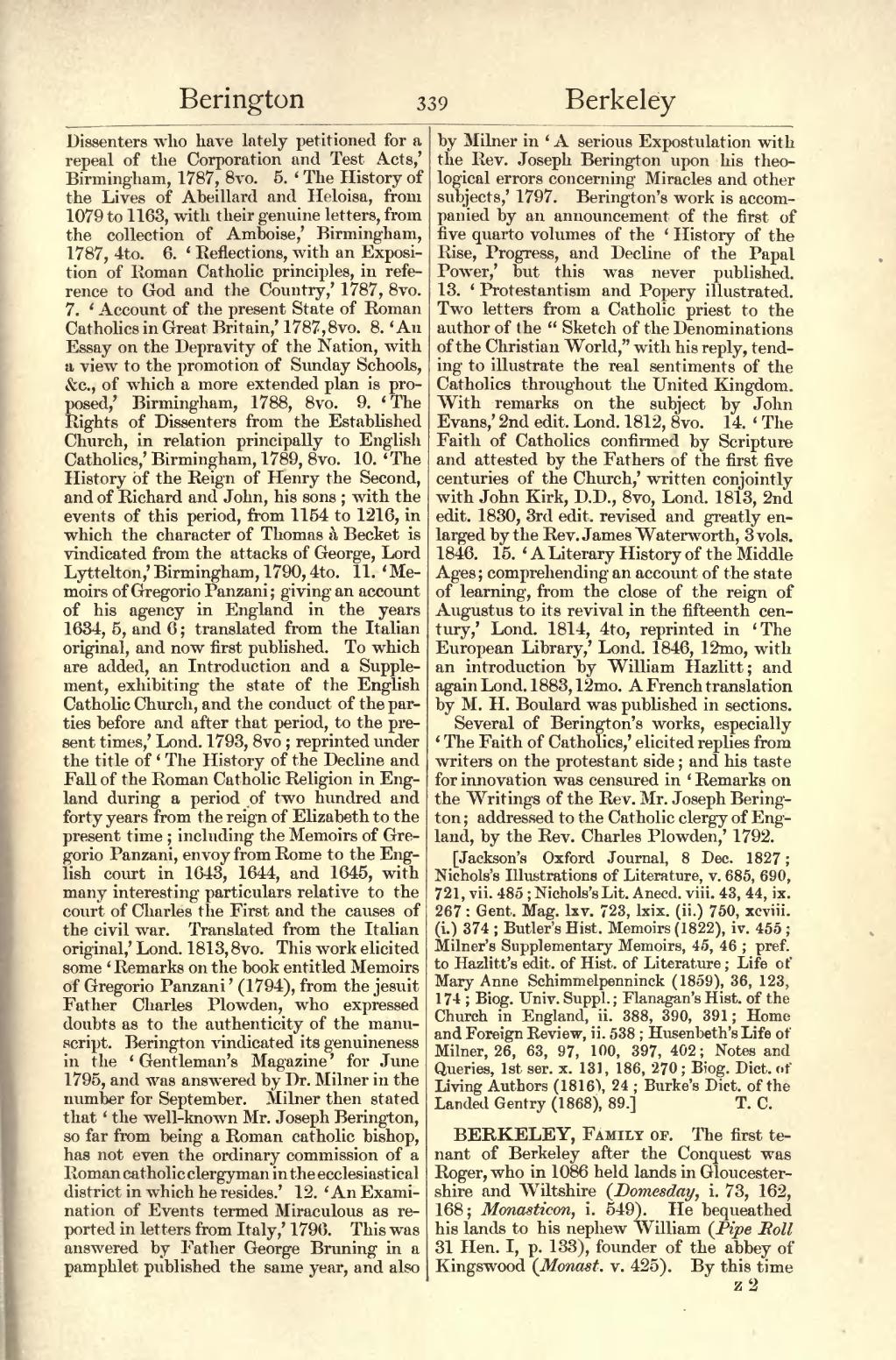- Dissenters who have lately petitioned for a repeal of the Corporation and Test Acts,' Birmingham, 1787, 8vo.
- 'The History of the Lives of Abeillard and Heloisa, from 1079 to 1163, with their genuine letters, from the collection of Amboise,' Birmingham, 1787, 4to.
- 'Reflections, with an Exposition of Roman Catholic principles, in reference to God and the Country,' 1787, 8vo.
- 'Account of the present State of Roman Catholics in Great Britain,' 1787, 8vo.
- 'An Essay on the Depravity of the Nation, with a view to the promotion of Sunday Schools, &c., of which a more extended plan is proposed,' Birmingham, 1788, 8vo.
- 'The Rights of Dissenters from the Established Church, in relation principally to English Catholics,' Birmingham, 1789, 8vo.
- 'The History of the Reign of Henry the Second, and of Richard and John, his sons; with the events of this period, from 1164 to 1210, in which the character of Thomas à Becket is vindicated from the attacks of George, Lord Lyttelton,' Birmingham, 1790, 4to.
- 'Memoirs of GregorioPanzani; giving an account of his agency in England in the years 1634, 5, and 6; translated from the Italian original, and now first published. To which are added, an Introduction and a Supplement, exhibiting the state of the English Catholic Church, and the conduct of the parties before and after that period, to the present times,' Lond. 1793, 8vo; reprinted under the title of 'The History of the Decline and Fall of the Roman Catholic Religion in England during a period of two hundred and forty years from the reign of Elizabeth to the present time; including the Memoirs of Gregorio Panzani, envoy from Rome to the English court in 1043, 1044, and 1046, with many interesting particulars relative to the court of Charles the First and the causes of the civil war. Translated from the Italian original,' Lond. 1813, 8vo. This work elicited some 'Remarks on the book entitled Memoirs of Gregorio Panzani' (1794), from the Jesuit Father Charles Plowden, who expressed doubts as to the authenticity of the manuscript. Benngton vindicated genuineness in the 'Gentlemans Magazine' for June 1795, and was answered by Dr. Milner in the number for September. Milner then stated that 'the well-known Mr. Joseph Berington, so far from being a Roman catholic bishop, has not even the ordinary commission of a Roman catholic clergyman in the ecclesiastical district in which he resides.'
- An Examination of Events termed Miraculous as reported in letters from Italy,' 1796. This was answered by Father George Bruning in a pamphlet published the same year, and also by Milner in 'A serious Expostulation with the Rev. Joseph Berington upon his theological errors concerning Miracles and other subjects.' 1797. Berington's work is accompanied by an announcement of the first of five quarto volumes of the 'History of the Rise, Progress, and Decline of the Papal Power,' but this was never published,
- 'Protestantism and Popery illustrated. Two letters from a Catholic priest to the author of the "Sketch of the Denominations of the Christian World," with his reply, tending to illustrate the real sentiments of the Catholics throughout the United Kingdom, With remarks on the subject by John Evans,' 2nd edit. Lond. 1812, 8vo.
- 'The Faith of Catholics confirmed by Scripture and attested by the Fathers of the first five centuries of the Church,' written conjointly with John Kirk, D.D., 8vo, Lond. 1813, 2nd edit. 1830, 3rd edit, revised and greatly enlarged by the Rev. James Waterworth, 3 vols, 1846.
- 'A Literary History of the Middle Ages; comprehending an account of the state of learning, from the close of the reign of Augustus to its revival in the fifteenth century,' Lond. 1814, 4to, reprinted in 'The European Library,' Lond. 1846, 12mo, with an introduction by William Hazlitt; and again Lond. 1883, 12mo. A French translation by M. H. Boulard was published in sections.
Several of Berington's works, especially 'The Faith of Catholics,' elicited replies from writers on the protestant side; and his taste for innovation was censured in 'Remarks on the Writings of the Rev. Mr. Joseph Berington; addressed to the Catholic clergy of England, by the Rev. Charles Plowden,' 1792.
[Jackson's Oxford Journal, 8 Dec. 1827; Nichols's Illustrations of Literature, v. 685, 690, 721, vii. 485; Nichols's Lit. Anecd. viii. 43, 44, ix. 267: Gent. Mag. lxv. 723, lxix. (ii.) 750, xcviii. (i.) 374; Butler's Hist. Memoirs (1822), iv. 455; Milner's Supplementary Memoirs, 45, 46; pref. to Hazlitt's edit. of Hist, of Literature; Life of Mary Anne Schimmelpenninck (1859), 36, 123, 174; Biog. Univ. Suppl.; Flanagan's Hist. of the Church in England, ii, 388, 390, 391; Home and Foreign Review, ii. 538; Husenbeth's Life of Milner, 26. 63, 97, 100, 397, 402; Notes and Queries, 1st ser. x. 131, 186, 270; Biog. Dict. of Living Authors (1816), 24; Burke's Dict, of the Landed Gentry (1868), 89.]
BERKELEY, Family of. The first tenant of Berkeley after the conquest was Roger, who in 1086 held lands in Gloucestershire and Wiltshire (Domesday, i. 73, 162, 168; Monasticon, i. 549). He bequeathed his lands to his nephew William (Pipe Roll 31 Hen. I, p. 133), founder of the abbey of Kingswood (Monast. v. 425). By this time
